
BRIQUETTE PRESS
The briquette press is a machine used to press various raw materials (including biomass waste, sorted MSW, industrial waste from factory, coal powder, metal ore powder, etc.) into a briquette with a large density and a specified size. The wood briquettes apply most widely all over the world.
Nowadays, there are many differences in waste disposal in different countries, such as domestic and industrial waste. The treatment standards and processes in many countries vary much to biomass waste. Agricultural waste and forestry wastes are burned directly in many developing countries. Which not only causes environmental pollution but also leads to energy waste. For the MSW and Industrial waste, landfills also caused a lot of land and water pollution. Therefore, more and more countries and enterprises are beginning to explore the feasibility of waste briquette press for waste recycling and energy utilization. Waste is transferred into Biomass or RDF briquettes by different kinds of Biruqtete presses. The process is becoming mature in agricultural, forestry, and industrial waste briquetting.
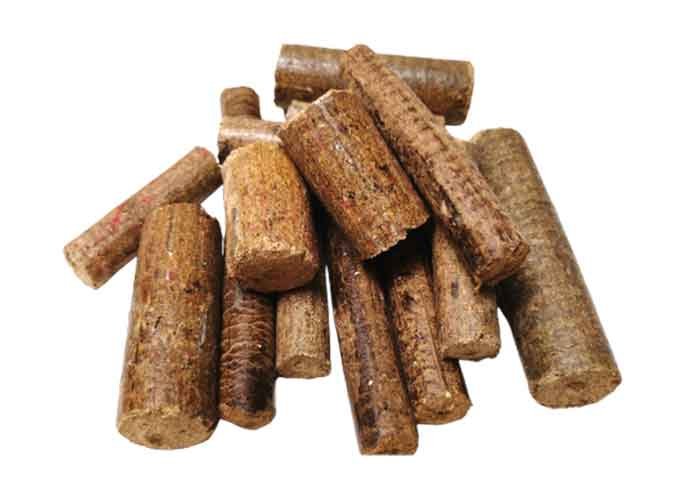

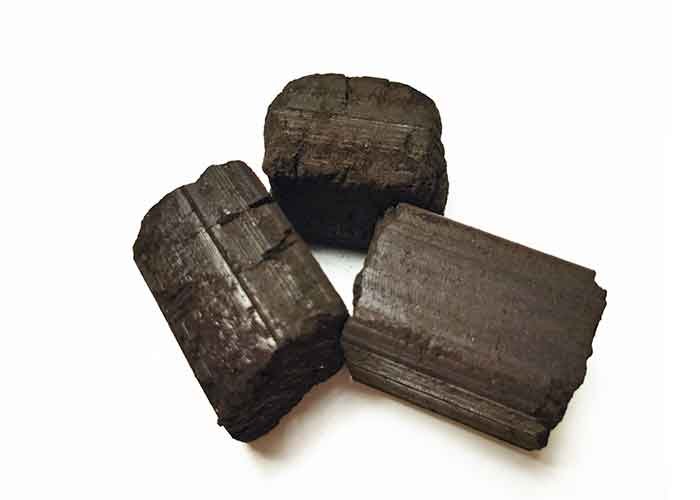
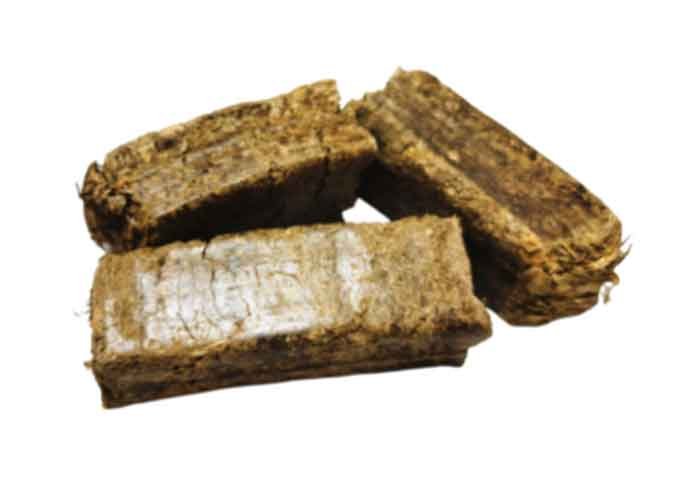
Briquette Presses Types
The briquette presses types are different according to the classification standard. According to design structure and working principles, there’s piston briquette press, screw briquette press, hydraulic briquette press, and ring mold briquette press.
Among them, the capacity and efficiency of the piston-type and the ring die type are higher than the screw and hydraulic types.
Classified by the working environment, there’s homemade briquettes press and industrial briquetting press. The former is manually operated with low cost and small output, while industrial briquetting presses with a fully automatic control system, large capacity, and higher efficiency.
According to raw materials, there are biomass briquette presses, MSW briquette presses, industrial waste briquette presses, etc. Currently, we usually classify by machine design and structure.
Piston Briquette Press
The output of a piston briquette press machine is usually within 800-3000kg/h, and the motor power equipped is between 45KW-90KW. The press with two inertia flywheels, and it’s driven by a dual-axis motor. The crank connects with the rod mechanism. Then the ram punch raw material. Among all of these briquette presses, it is the most energy-saving one. That’s mainly used to process biomass waste, sorted MSW and industrial waste in many projects and plants.
The piston briquette press can work continuously for 24 hours * 7days. Briquette is cylindrical, with or without an inner hole, the briquette diameter size at a range of 20mm-80mm choosable.
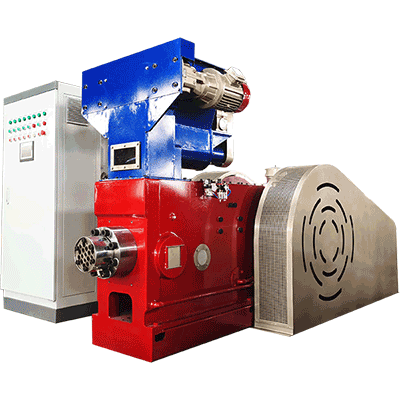
Piston Briquette Press
Single-mold piston briquette presses are generally chosen as a small machine at the initial stage of a business for a start. The investment is relatively small and can quickly test the market in a short time. Very easy to operate and maintain by workers in the daily running compared with other machines. It's full-automatic controlled by a PLC touch screen cabinet. It's suitable for processing a wide range of raw materials like rice husk, bagasse, sawdust, papers, plastic, and so on. It's a good choice when just beginning a new business.
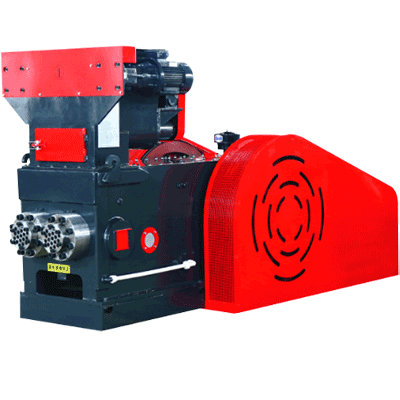
Doubie-mold Piston Briquette Press
The output of a piston briquette press machine is usually within 800-3000kg/h, and the motor power equipped is between 45KW-90KW. The press with two inertia flywheels, and it's driven by a dual-axis motor. The crank connects with the rod mechanism. Then the ram punch raw material. Among all of these briquette presses, it is the most energy-saving one. That's mainly used to process biomass waste, sorted MSW and industrial waste in many projects and plants. The piston briquette press can work continuously for 24 hours * 7days. Briquette is cylindrical, with or without an inner hole, the briquette diameter size at a range of 20mm-80mm choosable.
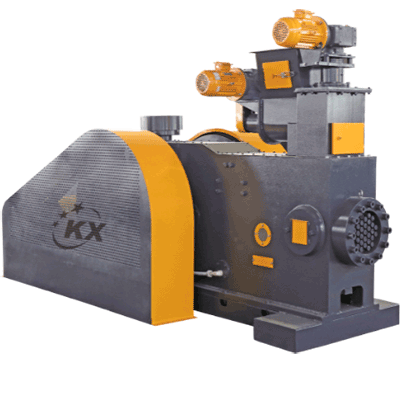
Heavy Piston Briquette Press
The heavy-duty single-mold briquette press is not a general model. It is used in some projects using rare raw materials. The main motor power is 90KW, usually with vertical and horizontal screws. For example, when your material fiber is different.
Ring Mold Briquette Press
Ring mode briquette press could process square or cylindrical crop straw and various industrial solid wastes. The raw materials include corn stalks, rice stalks, cotton stalks, wood chips, branches, barks, waste cloth strips, leather, paper residue, sludge, domestic garbage, and other agricultural or industrial solid wastes. The briquette density is 0.8-1.3g/cm3. The briquette system includes a feeding system, molding system, discharging system, temperature control system, electric control system, etc.
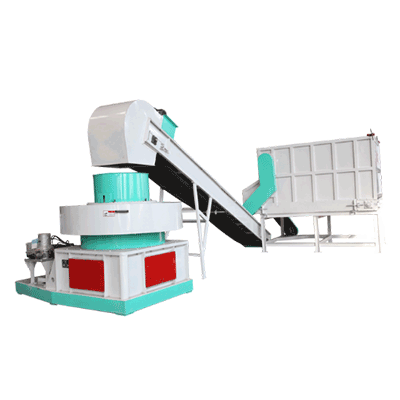
Reducer Type Ring Mold Briquette Press
The latest generation machines adopt reducer transmission mode, which avoids a series of problems such as belt loss compared with a traditional model. It avoids the power loss caused by pulley loss and belt pulley maintenance. For this type of briquetting press, the main motor power is lower, but the torque is improved, so the machine output is more stable, and the machine maintenance is easy and saves much more time. In addition, the whole machine with an overloaded system, so it runs stable, and labor cost saving when operating. It's more energy-saving with lower energy consumption and higher output.
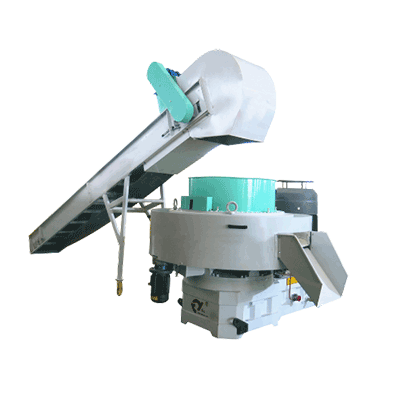
New Parallel Shaft Type Briquette Press
The whole machine adopts a modular design, so it's convenient for assembly and disassembly when doing maintenance. It's stable running with large output because of the new reducer designed. The briquette size usually keeps 32mm*32mm, and different briquette size customization is accepted. It is used in large-scale industrial production also.
Screw Briquette Press
The screw briquette press is a small scale press with output of 200-500 kg/hour. Small capacity and relatively smaller investment, so it is used by many small factories and individuals in the initial stage.
That’s mainly used to process biomass materials (such as sawdust, straw, rice husk, etc ) into rod-shaped hollow solid fuels under high pressure and temperature conditions. When screw briquette press work, they have relatively high requirements for the accuracy of moisture and material size. Usually, the raw material moisture is required to be within 8-12%, and the material size is within 8-10 mm. Therefore, the machine generally needs to be work with a grinder and air-flow dryer to make sure the size and moisture at right range.
The briquette produced by the briquette press are also used to produce charcoal briquettes after being carbonized in a carbonization furnace. So it is the crucial machine of a charcoal briquette plant.
However, the screws need doing maintenance period, and workers are required to regularly maintain the wearing parts of the machines. Therefore, the proficiency and operating experience of the workers when running the briquette press are relatively high.
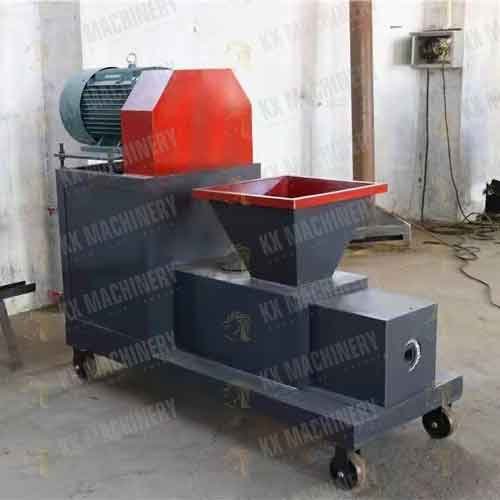
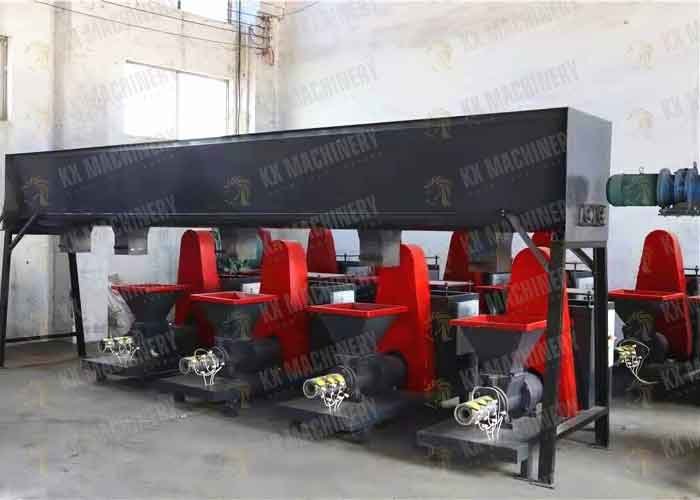
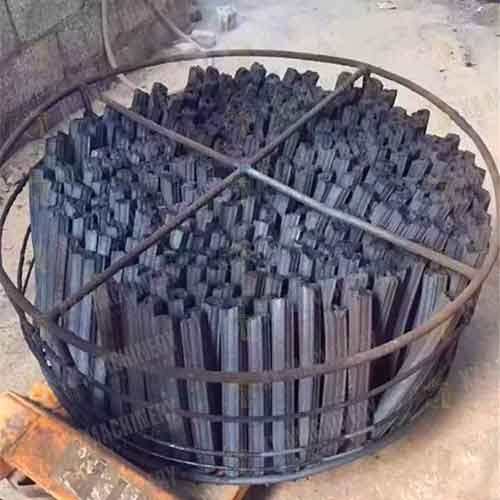
Hydraulic Briquette Press
The hydraulic briquette press is a double-roller ball press. It is mainly used to process raw materials such as coal powder, peat, mineral powder, dry powder, etc. It can also be used for briquetting of non-ferrous and ferrous metal mineral powder to briquette or ball before smelting.
All waste and auxiliary materials in the metallurgical industry need to be pressed by a hydraulic briquette press before melting, such as dust, sludge, oxide scale in the dust collector, steel slag, iron powder, aluminum powder, various mineral powders, etc. According to different models, the output of a machine varies between 1-70ton/h, the power of the main motor is between 5kw-160KW. The shape and size of briquettes can be customized.
The machine with reasonable structure, stable operation, high efficiency and low maintenance cost, so it is widely used in the field of mineral briquetting. However, some raw materials need to be added with a binder before briquetting.
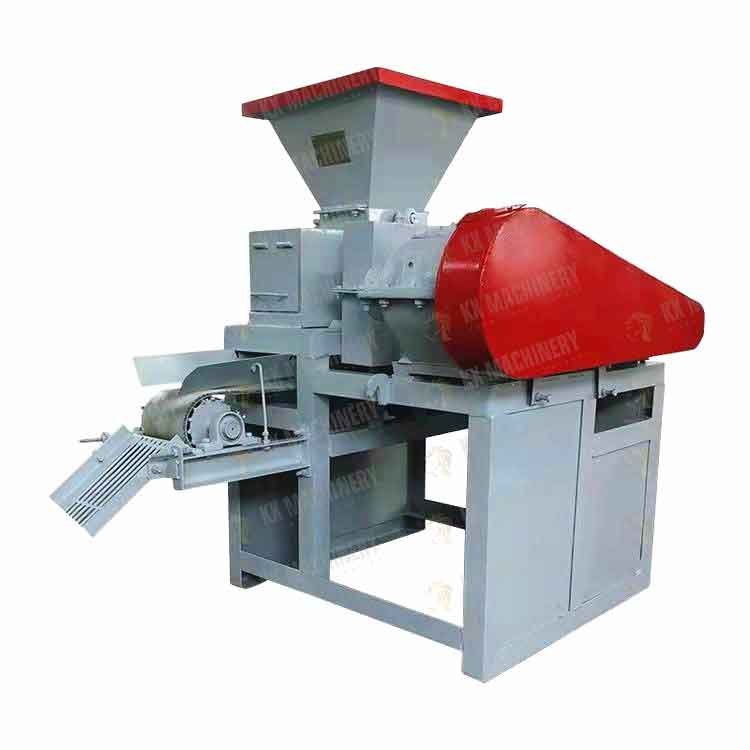
Briquette Press Running Video
Machine Type-Single mold Piston Briquette Press
Raw Material-Groundnuts Shell
Briquette Diameter-60mm
Machine Type-Double molds Piston Briquette Press
Raw Material-Sawdust
Briquette Diameter-60mm
Machine Type-Ring Mold Briquette Press
Raw Material-Sawdust
Briquette Size-32mm*32mm
Are Your Raw Materials Suitable For Making Briquettes?
Not all raw materials can be directly pressed by a briquette press, especially some agricultural wastes, forestry wastes and industrial wastes. Due to the large difference in size and moisture. For these types of raw materials, the best raw materials should be with suitable moisture content and size, and better with high calorific value.
These raw materials does not need to be dried and crushed, so no need crusher and dryer, then small area needed and machine cost lower much. These factors leads to low briquetting cost and lower labor cost, which can bring you higher profits.
These raw materials include dried wood chips, dried rice husks, dried copra, some kinds of industrial wastes, charcoal powder, waste plastics, waste paper, etc.

The Difference Between Briquette Presses
Different briquette presses have different designs, so the output of a machine, the raw materials can be pressed, and the applicable working environment are different much.
The screw briquette press is suitable for homemade and small-scale briquettes production, such as small and medium briquette plant and charcoal machine factories. Its output is small, and the power of the main motor is relatively smaller, so energy saving requirements are not so strictly.
For piston and ring mould briquette presses, the application fields are mostly large-scale briquette production plant, the requirements for machine capacity, energy consumption ratio, and stability are very high. So they are mostly used in medium and large plant. The application of hydraulic briquettte press is mainly in the field of metal and mineral processing, and a automatic control system not a must in these plants.
Followed is a comparison of the application of different kinds of briquette presses, Please have a view for your reference.
You are welcome to contact us to get more details.
Which Briquette Press Is Your Best Choice?
The selection of a briquette press is the most crucial factor when setting up a briquette plant. Usually, you have to consider the following factors to make a good decision.
- Your raw material.
Sawdust, rice husk, straw, domestic waste, construction waste, industrial waste, slag, or coal powder are usual materials. Different machine models are subject to raw material features.
- The machine output, briquette shape, and size
These factors are the second factor you need to take into consideration.
It will affect the energy consumption and machine operating costs, but also means which target market you’ll choose to sell your briquettes.
- The machine runs 24hours continuously
Not all briquette machines could run for 24 hours continuously. The machine maintenance time is a crucial factor you need to consider when choosing.
- Your project budget
Budget is crucial for your project, which is related to your choice of machine model. Machine prices vary much based on different machine production rates and configurations. You can contact us to get the latest proposal quotation for your raw material.

Advantages of Briquettes
- Big density, low storage and transportation costs. The briquette fuel get much higher density and smaller size, saves a lot of storage and transportation costs compared raw material, and it is clean when burning in the burner or stove. Therefore, it is a high-quality new fuel and has a wide range of applications in civil and industrial fields.
- The cost of raw materials is low and the briquette added value is high. Whether it is biomass briquette or industrial waste briquette, the fuel has a relatively high calorific value between 3500-6000 kilocalorie mostly, and with a longer burning time, a higher temperature in the enhanced furnace. Compared with traditional energy sources, it generally does not contain sulfur and phosphorus. This greatly extended the service life of the boilers.
- More waste become resources and can be used efficiently. After the material are processed into briquette fuel, the application range is greatly increased. It can be used in a variety of industries and combustion machines, so that the resource utilization rate is much higher.
- Biomass briquette is clean, sanitary and pollution-free. For wood waste, sawdust, chips and agricultural waste briquette, “zero emission” can be achieved during the combustion process, that means, no slag discharge, no smoke, no chlorine, no sulfur dioxide and other harmful gases, and no pollution to the environment. It is an environmentally friendly and clean energy and get a name of “Green Coal”.
- The source of raw materials is wide. Biomass resources and industrial waste resources are huge all over the world, that’s easy to get everywhere, and biomass material is renewable. It can be a good alleviate to traditional fuels when facing more and more serious energy crisis today.
Discover Your Market
Biomass briquette fuel and industrial waste briquettes can be widely used in stoves, heating burners, hot water boilers, steam boilers, drying furnaces and biomass gasifiers, etc. In addition, it can also be used for civil cooking and heating. It can also be used as fuel in industrial activities such as when drying wood plate, fruits, tea etc. It’s also be a good fuel for district heating and power generation etc. For biomass briquette, it can be used as a raw material for biogas fermentation, which can greatly increase the production efficiency of biogas.
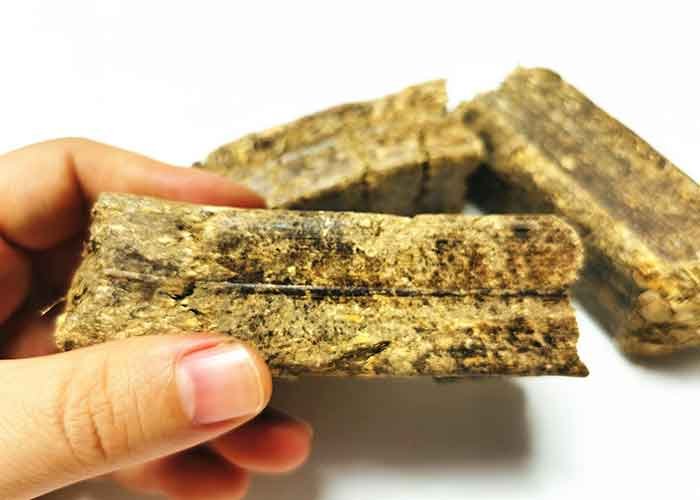
You May Also Want To Know
- There are so many types of briquette presses, which one should I choose?
- Can I visit your factory?
- Can you provide turnkey projects for the entire production line?
- Can you provide machine test run service before start?
- What is the briquette press price?

Answer All Your Questions About Briquette Presses?
EIf you have any questions about the briquette press, then please contact us anytime. Our engineers are very happy to support you and provide you with customized solutions to help you making best choice that suits your condition, and support you build your own briquetting plant. Welcome to contact us now!

